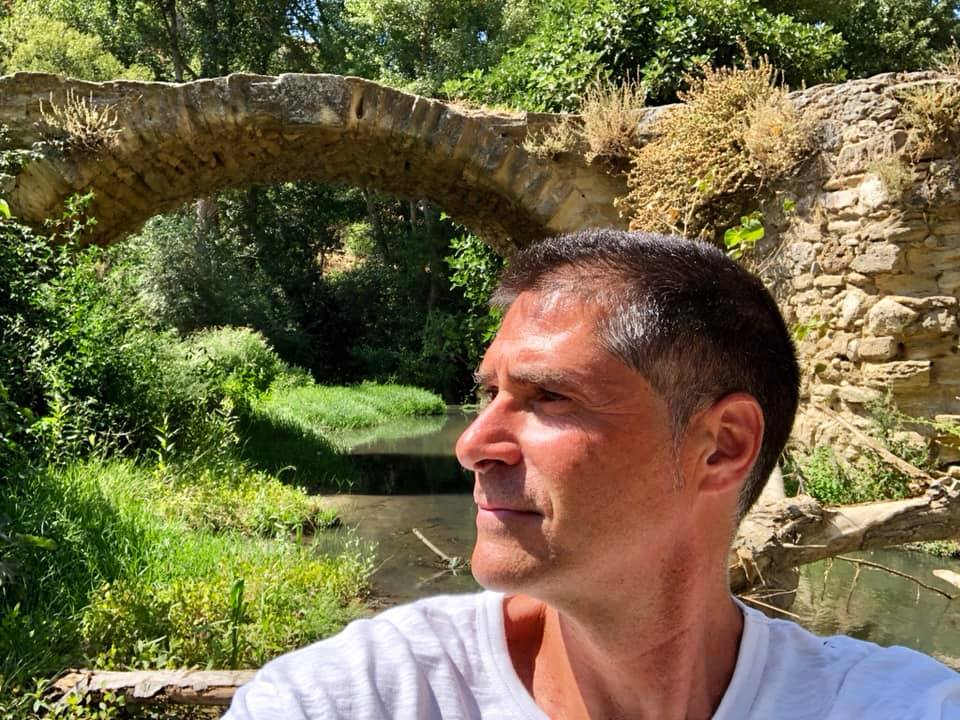‘Knowledge is the basis to believe in anything, hence Gravite’s commitment to the accelerator’
Jesús Lens, Director of Gravite Festival

Jesús Lens is communicator, cultural manager and Codirector of multicultural festivals Gravite and Granada Noir. Having worked in the legal sector and corporate communication, Jesús Lens currently works independently, writing columns in the IDEAL local newspaper since 1997 and as a regular collaborator to different media. Jesús Lens has published books on cinema and travelling. This interview addresses the role of IFMIF-DONES in the creation of the Gravite Festival, the focus of which is time travelling.
-Since its first edition, Gravite Festival has shown great interest in the IFMIF-DONES particle accelerator, the focus of the opening ceremony of the third edition and one of the topics in the first edition. What is your opinion about the project and its impact in Granada?
-I think it is a project that will define Granada’s future. It is probably the topic about which I have written the most in my column in IDEAL during the past year. Together with the Health Sciences Technology Park and Artificial Intelligence boosted by the University of Granada, it should lead the transition of the province towards an economy less dependent on tourism and hotel industry. IFMIF-DONES is science, research, innovation, which are essential in the 21st century. I once wrote about Granada aspiring to become the European ‘Neutron Valley’, inspired by Eduardo Ros, Full Professor at the Department of Computer Architecture and Technology of the University of Granada, who said that the richness of Granada is its knowledge, grey matter, talent, and intelligence.
-Gravite is a multidisciplinary festival, with time travelling as the focus, and with a place for science, literature, cinema, magic… How did you come up with such an idea for an event?
-The IFMIF-DONES project caught my attention as well as Gustavo Gomez’s. Granada is a marvellous city in which many civilisations have left their mark. As an Andalusian province, it is a bridge between Africa, Europe, and America. For this reason, it simulates a time machine allowing us to travel to prehistoric times, to Palaeolithic and Neolithic periods, and to Iberian, Roman and of course Arab civilisations. Since 1492 all schools of thought and art have made their mark.
Recently, Granada also looks at its future and allows us to dream. Granada is a city of science thanks to the Science Park, the Health Sciences Technology Park, and the scientific disciplines at which the University of Granada excels, namely Artificial Intelligence and the department led by Francisco Herrera. The Instituto Astrofísica Andalucía, the cutting-edge architectural design of buildings such as CaixaBank and the Cultural Center of CajaGranada Foundation are other examples. And then, the IFMIF-DONES Project emerges, with everybody on board and committed. We cannot afford to miss this opportunity!
-Your interest in time travelling is widely known, which becomes evident at the Gravite Festival. Where does this passion come from?
-It might be because I am getting older. The first time I was aware of time was with Comet Halley’s visit in 1986. The news informed that it would not pass by again until 2061. I then realised that if everything went well, I would be 91 years old by then. What would I be like? And my family and friends? What about the world? Would there still be whales, a topic which was of my concern at the time?
I have always been an ambitious person. I wanted to be everywhere and in different places at the same time. Time passed too quickly. Being in control of my time has always been my greatest desire. And from there to time travelling there is only a small step. Although my admired professor Juan Varo states that it is not a good plot for current science fiction, it still fascinates me.
Time travelling is also very related to rectifying, growing, and maturing. We have all wanted a second chance, going back to the past and doing things differently. We also have the multiverses. Who has not ever wanted to be someone else? Who has not fantasied about how their lives would be if they had made different decisions? Thinking about different ‘us’, although it might sound self-centred, is also time travelling. Especially because it allows us to dream about where we want to be in the future and with experience do what is in our hands to reach that future. Even the impossible.
-IFMIF-DONES is generally related to science, energy, engineering, or economy. Do you think this project is unconnected to careers in humanities and arts?
Not at all. In fact, this is my case. One of the happiest days of my life was when I passed Physics, Chemistry and Mathematics in high school and said goodbye to them for ever. The following year I had History of Art, Greek, Philosophy and Latin. Science-related subjects were part of my past, and I was happy with this, or so I thought!
A few years later I found myself working for a financial entity and calculating compound interests of loans. And now, I attend conferences in which I try to understand what neutrons are or, as it is the case of many peers, I do crash courses on bacteriology, immunology, and virology.
Comic books such as Sentient, by Jeff Lemire and drawn by Gabriel Hernández Walta, or Multiversos musicales, by the musician Antonio Arias, show that science, humanities, and arts are interrelated.
Gravite emphasizes the importance of this third culture that builds bridges between humanities and science, as defined by John Brockman.
I would like to highlight the importance of mass media when publishing news and scientific information, which should be done in plain language, accessible for the general public. It is everybody’s duty to inform about the IFMIF-DOENS project in Granada. Its potential should be explained and understood. Knowledge is the basis to love and believe in anything; hence Gravite’s commitment, thanks to the support by CaixaBank and CajaGranada Foundation.